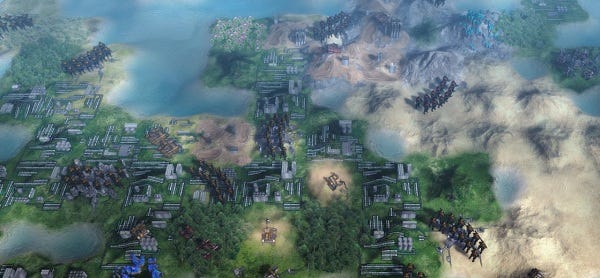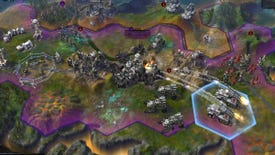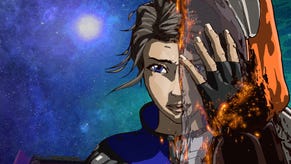Impressions: Pandora - First Contact
Alpha Obtainium
The version of Pandora: First Contact that I've been playing since last week is far from complete - it's stable and packed with potential but the tech tree and map generation are just two major features that are due to experience major overhauls. When the game in question is a strategic task of exploration and colonisation on an alien planet not a thousand light years from Alpha Centauri's neck of the universe, those aspects are important, so I can't provide an informed opinion as to what Pandora will achieve. But I can say that many of the pieces are in place and it is, at the very least, a pleasing echo of Firaxis' finest.
We haven't posted this video from the developers before. Perhaps you would like to watch it before reading the words, or perhaps you would like to read it afterwards or not at all. I'm good with whatever you decide.
Just to be clear, Alpha Centuari is as good as you remember it being; a complex and involving strategy game with a narrative throughline that delivers on both its hard science leanings, and its tales of human complexity and contrariness. It's a horrific shadow to be in, like that cast by some void-dwelling space-hawk hovering over its quivering prey, but Pandora is happy to be there. The set up takes the notion of 'spiritual successor' and all but switches out 'successor' for 'sibling'. There are factions with wildly different ideologies and they are attempting to set up new colonies and new societies on an alien planet, which becomes increasingly hostile to their existence as they exploit its resources and each others' weaknesses.
Units can be customised and named, which meant that my troopers were soon dashing about with flamethrowers, rebranded as 'Scourge Bastards', burning intestinal drone-hives wherever they could find them. Each type of Pandorian terrain is more likely to spawn certain species of creature and in my first game, I found myself surrounded by pulsating purple sacs. Occasionally a group of monstrosities would emerge from within and assault my Scourge Bastards, or leather-winged giants would shriek overhead, ignoring the Bastards but objecting to any vehicles in sight. Objecting with talons and blade-beaks, and probably acid blood or corrosive urine. It's a hostile world, is my basic point.
Initially, I thought staying ahead of the critter curve would be simplicity itself. I was researching new ways of killing and while they might have evolved with weapons instead of faces, science would counter such threats. Weapons, which attach to squads of people and vehicles alike, are generally strong against one or two basic enemy types: mechanical, biological and aerial. The First Battallion Flaming Hot Scourge Bastards may be able to melt flesh with ease but they're not a great deal of use against a tank or a squadron of bomber jets.
The early game generally sees the first colony of the player's chosen faction pitted against whatever inhabitants of Pandora happen to be caught in the landing zone but it doesn't take long for the other humans to show up. I've found that I'm more inclined to experiment with units and combat than expansion, so I can't give a particularly accurate assessment of how aggressively factions will defend their borders. Astonishingly, my attempts to secure peace across extreme ideological divides have been a success on the whole, although that may be almost entirely due to my own lack of power. Perhaps even the most rabid industrialist and nature-hater will ignore the tree-touching environmentalist if the latter is feeble enough. I'm probably not worth the effort and, besides, I may love the trees, the flowers and every blade of grass, but I am furiously melting anything that has more than two legs.
It's when the planet starts to react angrily that the game really becomes interesting. A message about increasing alien presence is suggestive of a migratory event but it heralds something much darker. Yes, darker than relocation if you can imagine such a thing.
Tech trees are due for an overhaul and that's a good thing. The flavour text, as in diplomacy and general descriptions, does a good job of conveying the weirdness of some of the tech and telling a story as it goes, but the process of discovery is far too predictable at the moment. The changes will, apparently, introduce more mystery and randomisation and that sounds ideal. Indeed, the beta as a whole is polished and performs well, but there's a predictability to the way that each campaign plays out. When it hits the heights it's already capable of, the game is the closest thing to Alpha Centuari I've played since I last played Alpha Centauri (and, my word, it's been too long - I'm installing it as soon as I finish writing), and the similarities are in the quality of the construction as well as the more obvious mimicry.
Slitherine seem to be going about this the right way. The beta is functional and leaves a strong impression, but the work of the remaining weeks before the proposed mid-June launch will be vital. The writing is strong and unit customisation works well, particularly as new threats force changed tactics, leading to patchwork armies that limp from crisis to crisis. The changes to the tech tree should add more variety and that's what Pandora needs - a greater sense of discovery and of more individual qualities in each faction, beyond their speech and appearance.
I've been expecting an Alpha Centauri crowdfunding campaign - most likely without the name - since Double Fine blew Kickstarter's doors off. Pandora has been in development for a couple of years so it charted its course too early for Kickstarter to be a real consideration, but I do wonder if it'd be receiving much more attention if it were a concept, a video and a few screenshots on a campaign page rather than a fully functioning beta of a product from a company known for historical strategy games. It really does deserve more attention, even if it doesn't quite live up to the ancestor it has adopted. As it stands, First Contact is an exciting prospect and in a few months, it could be something very special indeed.















